
Imagine getting this message from your South African friend:
“Hey! Come jol with us on Saturday afternoon; we are going to gooi something lekker on the braai. The party will be under the lapa.”
Do you have any idea what this message means? Let us know in the comments! At AfrikaansPod101.com, we love hearing your thoughts and opinions, so feel free to weigh in.
But if you’re not really sure what your friend just invited you to, no worries. That’s ‘Afrikaan-lish,’ or rather, a blend of Afrikaans, English, and even one word appropriated from one of South Africa’s other languages!

The example used above illustrates how languages cross-pollinate and influence one another. This is important, because nowhere in South Africa is Afrikaans spoken in complete isolation from English.
 Table of Contents
Table of Contents
- It’s Important to Learn English Words in Afrikaans
- Afrikaans Words Used in English
- Learn Much More Than English Words in Afrikaans with AfrikaansPod101!
It’s Important to Learn English Words in Afrikaans
If you’re serious about learning nuanced Afrikaans in order to sound like and understand native speakers, it’s necessary to also study the phrases and vocabulary taken from other languages. Because the Afrikaans meanings are sometimes different from those in the original language, you’ll miss important clues about a conversation’s context if you’re not familiar with them.
Afrikaans is influenced by many languages. However, for the purpose of this article, we’ll be focusing on English influences on Afrikaans (and vice-versa). Afrikaans can be a fun language to learn—it is very descriptive and has real heart!
So, let’s start with a list of English words used in Afrikaans. They are organized into different categories, but take note that it’s not a simple classification.

1 – Loanwords
Scholars and linguists often debate the acceptability of some loanwords. However, loanwords are an integral component of nearly every major, internationally spoken language. Over time, these words become more incorporated into the general vernacular of the host language and become standardized. A great example is the word charcuterie (French for “cold, cooked meats”), which is accepted and commonly used in both English and Afrikaans.
There are plenty of English loanwords in Afrikaans; the list we’re providing is not exhaustive.
Standardized Loanwords:
The following examples are English loanwords that appear in Afrikaans dictionaries. Their use is accepted in any context (i.e. formal and informal) and they generally retain their original English meaning.
- Chop-chop
- Denim
- In English, this word only refers to the material that garments (such as jeans) are made of. In Afrikaans, it refers to both the material and the garment “jeans.”
- Garage
- Refers to both fuel stations and the place we leave our cars for the night.
- Muffin
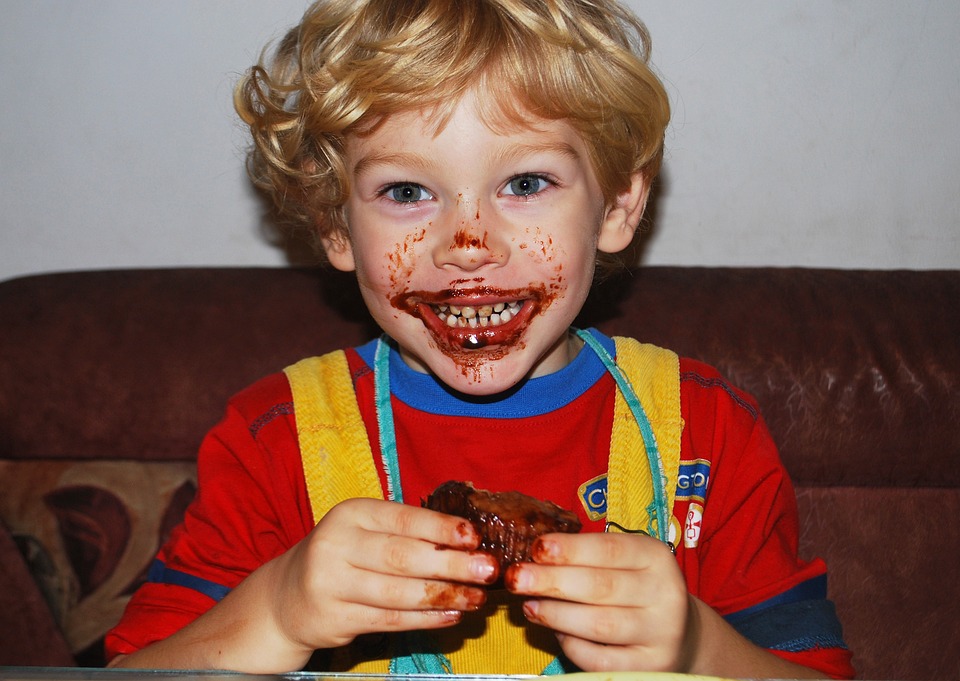
Die seun geniet die muffin. (“The boy enjoys the muffin.”)
- Robot
- This refers not only to a machine resembling a human being in appearance and/or function; in Afrikaans, it is also the word for “traffic light.”
- Speaker (in Parliament)
- Township
- In South African English, this refers to a city or suburb that was specifically designated for people of color under the country’s previous dispensation.
- Whiskey
Non-Standardized Loanwords:
You won’t get struck by lightning if you pepper your Afrikaans with these, but it would be better to limit their use to casual and informal conversations.
- Awesome
- Cool
- Funky
- Great
- Gross
- Panties
- Punk
- Savvy
- Scary
- Selfie
- Sexy
- Tissue
- Rocker
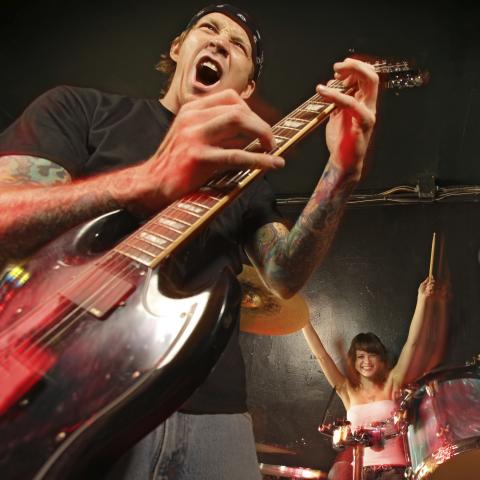
Die rockers geniet hulself vanaand. (“The rockers are enjoying themselves tonight.”)
2 – Anglicisms
An Anglicism is any word or language construction that another language borrows from English.
It’s easy to confuse them with loanwords, as there is only one important distinction: an Anglicism is a language construct that’s directly taken from English, which looks and sounds like Afrikaans but actually distorts the Afrikaans idiom. This means that Anglicisms unnecessarily replace perfectly good Afrikaans words or phrases, and their use is therefore not really acceptable in formal or academic conversations. (That said, they are so commonplace in colloquial Afrikaans that many native speakers don’t even know they’re using Anglicisms!)
| ANGLICISMS | CORRECT AFRIKAANS |
| DOEN – “DO” / “DOES” | |
| Sy doen haar ma ‘n guns. “She does her mom a favor.” | Sy bewys haar ma ‘n guns. |
| Ek wil niks met hom te doen hê nie. “I don’t want anything to do with him.” | Ek wil niks met hom te make hê nie. |
| Ons rugbyspan doen goed hierdie seisoen. “Our rugby team is doing well this season.” | Ons rugbyspan vaar goed hierdie seisoen. |
| A: Hou die kind van vrugte? B: Ja, hy doen! A: “Does the child like fruit?” B: “Yes, he does!” | Hou die kind van vrugte? Ja, hy hou daarvan! |
| Jou hare is mooi gedoen! “Your hair is done prettily!” | Jou hare is mooi opgeknap! |
| Sy kan doen met ‘n haarsny. “She can do with a haircut.” | Sy het ‘n haarsny nodig.“She needs a haircut.” |
| Dit sal doen, dankie. “That will do, thank you.” | Dit sal voldoende / genoeg wees, dankie. |
| Die katjie kan nie sonder sy kombers doen nie. “The kitten cannot do without its blanket.” | Die katjie kan nie sonder sy kombers klaarkom nie. |
| GAAN – “GO” / “GOES” | |
| Wat kan verkeerd gaan? “What can go wrong?” | Wat kan skeefloop / verkeerd loop? |
| Die kinders gaan vir die roomyskarretjie. “The children go for the ice cream car.” | Die kinders pyl / storm op die roomyskarretjie af. |
| Hulle gaan sonder koffie vir Lydenstyd. “They go without coffee for Lent.” | Hulle bly sonder koffie vir Lydenstyd. |
| Sy het vir my gegaan in die publiek! “She had a go at me in public!” Note: Do you spot the two Anglicisms here? | Sy het my ingevlieg / ingeklim in die openbaar! |
| HARDE – “HARD” | |
| Hierdie is die harde feite. “These are the hard facts.” | Hierdie is die moeilike / nugter feite. |
| Hulle het ‘n harde lewe. “They have a hard life.” | Hulle ly ‘n swaar lewe. |
| My sensei is ‘n harde leermeester. “My sensei is a hard master.” | My sensei is ‘n veeleisende leermeester. |
| Die afskeid is hard op almal. “The departure is hard for everyone.” | Die afskeid is moeilik vir almal. |
| Die dief is met harde arbeid gevonnis. “The thief was sentenced to hard labor.” | Die dief is met dwangarbeid gevonnis. |
| Die Covid19 pandemie is baie hard op almal. “The Covid-19 pandemic is very hard on everyone.” | Die Covid19 pandemie is baie swaar vir almal. |
| Hy het hard geval. “He fell hard.” | Hy het hom disnis geval. |

My sensei is ‘n veeleisende leermeester. (“My sensei is a hard taskmaster.”)
| HET – Approximate: “HAS” / “HAVE” | |
| Het jy dit in jou? “Do you have it in you?” | Sit dit in jou? |
| Hy het wat dit vat vir hierdie posisie. “He has what it takes for this position.” | Hy is geskik vir hierdie posisie. |
| IN – “IN” | |
| Een in ‘n miljoen “One in a million” | Een uit ‘n miljoen |
| Ons gaan trek in twee maande se tyd. “We’ll be moving in two months’ time.” | Ons gaan binne twee maande trek. |
| Die vliegtuig is in. “The plane is in.” | Die vliegtuig het aangekom. |
| Julle is in vir moeilikheid. / Julle soek vir moeilikheid. “You’re looking for trouble.” | Julle gaan aan die pen ry. / Julle gaan in die moeilikheid beland. |
| Maak jou versoek in skrif. “Make your request in writing.” | Stel jou versoek skriftelik. |
| Kom in! “Come in!” | Kom binne! |
| Hou my ingelig asseblief. “Keep me informed please.” | Hou my op hoogte, asseblief. |
| MERK – “MARK” | |
| Hy’t sy merk gemaak in die lewe. “He made his mark in life.” | Hy het homself onderskei in die lewe. |
| Zuma is ‘n gemerkte man. “Zuma is a marked man.” | Zuma is ‘n gebrandmerkte man. |
| Daardie is goeie merke vir die eksamen. “Those are good marks for the exam.” | Daardie is goeie punte vir die eksamen. |
| PART – “PART” | |
| Hy speel ‘n part in die onlangse politieke drama. “He plays a part in the current political drama.” | Hy speel ‘n rol in die onlangse politiek drama. |
| Dis goed in parte. “It’s good in parts.” | Dis gedeeltelik goed. |
| Die parte vir my motorfiets is skaars. “The parts for my motorbike are rare.” | Die onderdele vir my motorfiets is skaars. |
| Apart daarvan is sy ‘n oulike vrou. “Apart from that, she’s a nice woman.” | Afgesien daarvan is sy ‘n oulike vrou. |
| SIEN – “SEE” | |
| Hy sal nog die dag sien dat … “He will see the day that …” | Hy sal nog die dag belewe dat … |
| Laat ek sien. “Let me see (about that).” | Laat ek dink daaroor. Gee my tyd.Lit. “Let me think about that. Give me time.”” |
| Dis ‘n moeilike situasie. Kan sy dit sien? “It’s a difficult situation. Can she see that?” | Dis ‘n moeilike situasie. Kan sy dit verstaan / begryp? |
| Sy wou my nie sien nie. “She didn’t want to see me.” | Sy wou my nie ontvang nie. |
| Ek gaan die bestuurder sien. “I’m going to see the manager.” | Ek gaan die bestuurder spreek. |
| OPTEL – “PICK UP” | |
| Jy het Afrikaans vinnig opgetel. “You picked up Afrikaans quickly.” | Jy het Afrikaans vinnig aangeleer. |
| Die bul tel gewig op. “The bull is picking up weight.” | Die bul sit lyf aan.Literally: “The bull puts on some body.” |
| Sal jy die kinders optel by die skool? “Would you pick up the kids from school?” | Sal jy die kinders oplaai by die skool? |
| PUNT – “POINT” | |
| Dis waar tot op ‘n punt. “That’s true up to a point.” | Dis waar tot ‘n mate. |
| Maak ‘n punt daarvan …. “Make a point of it …” | Stel jou dit ten doel … |
| Sy sien my punt. “She sees my point.” | Sy sien my standpunt in. |
| Dialoogvoering is haar sterk punt. “Dialoguing is her strong point.” | Sy munt uit in dialoogvoering. / Dialoogvoering is haar talent. |
| Jy rammel, kom tot ‘n punt. “You’re rattling on, get to the point.” | Jy rammel, sê wat jy wil sê.Literally: “You’re rattling on, say what you want to say.” |
| STAAN – “STANDS” | |
| Hy staan uit in sy musiekklas. “He is standing out in his music class.” | Hy blink uit in sy musiekklas.Literally: “He is shining out in his music class.” |
| Sy kan die reuk nie staan nie. “She cannot stand the smell.” | Sy kan die reuk nie verdra / verduur nie. |
| Sal jy staan vir die Parlement? “Would you stand for Parliament?” | Sal jy jou verkiesbaar stel vir die Parlement? |
| Die opvoering was uitstaande. “The performance was outstanding.” | Die opvoering was uitstekend. |
| VAL – “FALLS” | |
| Ons planne het deurgeval. “Our plans fell through.” | Ons planne het in duie gestort. |
| Val vir versoeking “Falls for temptation” | Swig voor die versoeking. |

Sy wil swig voor die versoeking. (“She wants to fall for the temptation.”)
| ANGLICISMS – Other phrases | CORRECT AFRIKAANS |
| Die emmer skop “Kick the bucket” This saying means something or someone has died. | Lepel in die dak steek. Literally: “Stick the spoon in the roof.” |
| Ek verwag hulle nou enige minuut. “I am expecting them any minute now.” | Ek verwag hulle enige oomblik. |
| Hulle gaan ‘n dans hou. “They’re going to host a dance.” | Hulle gaan ‘n dansparty hou. |
| Hy studeer wet. “He’s studying law..” | Hy studeer regte. |
| Ek woon twee deure van hom af. “I live two doors from him.” | Ek woon twee huise van hom af. |
| Daar is ‘n sterk familie ooreenkoms. “There is a strong family resemblance.” | Daar is sterk familietrekke. |
| Ons finansiële posisie is goed. “Our financial position is good.” (Not to be confused with the accounting term “financial position.”) | Ons geldelike omstandighede is goed. |
| Die gemors is haar fout. “The mess is her fault.” | Die gemors is haar skuld. |
| Sy spel is uitstaande. “His playing is outstanding.” | Sy spel is uitstekend. |
| Sy is af siek. “She’s off sick.” | Sy is afwesig as gevolg van siekte. |
| Die tyd hardloop uit. “Time is running out.” | Die tyd word min. |
| Dit spreek nie rerig die probleem aan nie. “That doesn’t really address the problem.” | Dit hanteer nie werklik die probleem nie. |
| Ek skrik my byna dood. “I nearly died with fright.” | Ek skrik my boeglam. |
| Bloed is dikker as water. “Blood is thicker than water.” | Die hemp is nader as die rok. |

Hy speel uitstekend. (Literally: “He is playing outstandingly.”)
Afrikaans has a lot of Anglicisms! As said, they remain a point of contention among linguists. Now that we’ve covered just a few phrases, here are some individual Anglicized words you should know.
| ANGLICISMS – Other Vocabulary | CORRECT AFRIKAANS |
| addisioneel (“additional”) | bykomend |
| admireer (“admire”) | bewonder |
| akkommodasie (“accommodation”) | verblyf |
| akkommodeer (“accommodate”) | insluit; inneem; aanpas |
| aktiveer (“activate”) | ontketen; aan die gang sit; veroorsaak; aansit |
| analiseer / analise (“analyze” / “analysis”) | ontleed / ontleding |
| area (“area”) | gebied |
| arrestasie (“an arrest”) | inhegtenisname |
| detail (“detail”) | besonderhede |
| braaf (“brave”) | dapper |
| valstande (“false teeth”) | kunsgebit |
| opbottel (“to bottle up”) | opkrop |
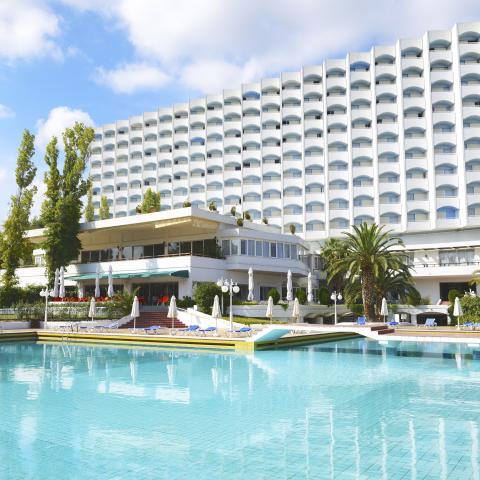
Vakansie veblyf (“Holiday accommodation”)
3 – Loan Translations
A common mistake is to label any Afrikaans word that sounds English as an Anglicism. But it’s important to remember that Afrikaans and English share the same Indo-European or West-Germanic roots. Therefore, some words sound and look like Anglicisms but are actually legitimate, native Afrikaans vocabulary. We call these “loan translations,” and they are often derived from French or Dutch.
| AFRIKAANS LOAN TRANSLATION | SIMILAR IN ENGLISH |
| Evalueer | “Evaluate” |
| Assesseer | “Assess” |
| Filosofie | “Philosophy” |
| Intervensie | “Intervention” |
| Boekmerk | “Book mark” |
| Broodlyn | “Bread line” |
| Piesangrepubliek | “Banana republic” |
| Diefwering | “Burglar proofing” |
| Kougom | “Chewing gum” |
| Middeljarig | “Middle-aged” |
| Maalvleis | “Minced meat” |
| Rommelverkoping | “Jumble sale” |
| Woefkardoes | “Doggy bag” |
| Sleng | “Slang” |
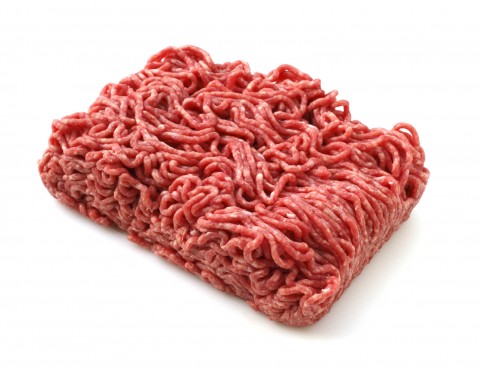
Hierdie is lae-vet maalvleis. (“This is low-fat mince.”)
Afrikaans Words Used in English
This will be fun!
South African English expressions are as peppered with Afrikaans loanwords, loan translations, interjections, and slang as the other way around. Most Afrikaners are bilingual, especially city-dwellers.
The following list is not exhaustive, but we have included the most popular Afrikaans loanwords that South African English speakers use.
- → While you’re here, be sure to learn more about Afrikaans slang in our article on The Best Afrikaans Internet Slang and How to Use it!
| AFRIKAANS USED IN ENGLISH | MEANING |
| Afrikaans | This is the language of the Afrikaner people from South Africa. |
| Apartheid | Literally: “Apart-ness” This refers to the very strict racial segregation policies as enforced by the previous South African regime. |
| Ag man | Literally: “Aw man” This is a common interjection that can depict…almost any mood! |
| Biltong | Approximate: “Beef jerky” This is dried meat, usually beef though it can also be ostrich or game. It is a very popular snack among South Africans. |
| Boet | Literally: “Brother” This is often a casual term of endearment among close male friends. However, in certain situations, it can be seen as patronizing. Don’t ever address your boss as Boet, for instance! |
| Boer | Literally: “Farmer” This usually refers to an Afrikaans-speaking South African, usually Caucasian and sometimes politically conservative and racist. |
| Boerewors | Literally: “Farmer’s sausage” This is a unique South African sausage we love to cook over the coals. |
| Braai | “Barbeque” |
| Doos | Literally: “Box” If the speaker uses this word to refer to another person, it’s an Afrikaans expletive that means the same as “idiot,” “twat,” or “prat,” but more vulgar. It is added here for identification purposes only—it’s not to be used in polite, respectful, and civil conversation! |
| Dof | Literally: “Dim” This is a derogatory pronoun that describes a slow-witted person. |
| Dop / Doppie | Literally: “Screwtop” This is slang for an alcoholic drink. |
| Droëwors | Literally: “Dried sausage” This refers specifically to dried boerewors, a cousin of the Portuguese chourico or the Polish cabanossi. However, it’s only made with beef, ostrich, or game, not pork. |
| Fynbos | Literally: “Fine bush” This flowery plant family is found only in South Africa, mostly along the coast of the Eastern and Western Cape provinces. The “fine” refers to the shape of the leaves. |
| Ja | “Yes” |
| Jol | This means the same thing as “play,” but it usually refers to having fun. |
| Kraal | This refers to an African rural village or an enclosure for cattle. |
| Koeksisters | Literally: “Cake sisters” This is a traditional, very popular Afrikaans confectionary that comprises pieces of twisted, deep-fried dough that’s been dipped in syrup. |
| Koppie | Literally: “Cup” or “Small head” It means “cup” / “small head” only in Afrikaans. Yet, in both Afrikaans and English, it also refers to an African monadnock, or a low-ish hill. |
| Lekker | This is a slang interjection that means “tasty,” “good, and “nice.” |
| Mielies | This is corn on the cob or maize. It’s traditionally steamed or boiled as is, and enjoyed with salt and some butter. |
| Rooibos | Literally: “Red bush” This is an indigenous shrub from the fynbos family. Its leaves are used to brew a very popular tea with many health properties. |
| Rondavel | This is a round hut with a thatched roof. |
| Trek | “Haul” |
| Veld | It is very close in meaning to “field” but it also refers to African vegetation. |
| Voetstoots | Literally: “Push with foot” This is a term used in business that means “as is.” It usually implies that there’s no guarantee, and can sometimes also mean “no returns.” |
| Ystervarkies | Literally: “Iron piglets” These are very similar to lamingtons and are a huge favorite at the tea table. |
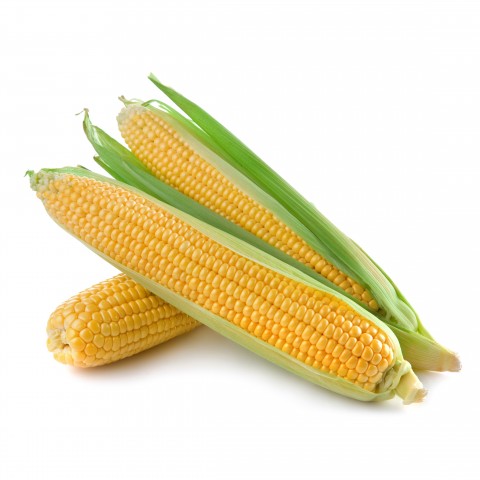
Ons eet mielies vir aandete vanaand. (“We’re having mielies for supper tonight.”)
Well, that’s about it! We hope you learned a lot and enjoyed this article. Can you now translate the text your imaginary South African friend sent you? Write your interpretation in the comments below!
When studying any language, it’s important to learn and recognize its most commonly used loanwords.
For instance, the word lapa in the message is a Sotho loanword commonly used in many of South Africa’s languages, including Afrikaans and South African English. It refers to a building construction described by one manufacturer as “a timber frame crafted from African hardwood poles supporting a genuine and fully thatched roof.” Lapas come in different shapes and sizes, and many Afrikaners’ homes have one close to the outside pool. It usually forms part of the entertainment area.
Because a lapa is mentioned, this indicates that the event will be held exclusively outside. This could be important info depending on the season, because it could hint that the weather will be cool and you should dress warmly.
Learn Much More Than English Words in Afrikaans with AfrikaansPod101!
When you sign up for a Lifetime Account, you get multiple benefits immediately at your fingertips! You’ll gain access to thousands of lessons and tools tailored to meet you at your level of Afrikaans proficiency so you can start right away.
We provide topic-related, culture-specific Afrikaans vocabulary lists (like this 100 Core Afrikaans Word List) as well as easily accessible lessons that introduce vocab in both writing and audio recordings. This ensures you learn the language as it’s pronounced by native Afrikaans speakers.
You’ll also gain access to the following, and so much more:
- A vibrant online community
- Free lessons on iTunes
- Free audio books
- Excellent free apps
- Free Word of the Day
- An Online Afrikaans Dictionary
The value is simply unbeatable!
If you’re serious about your learning, we have several learning options to suit your pocket and your language learning needs. Take a look at our three different learning plans, each one affordable while still providing great value for your money.
Happy Afrikaans learning!













